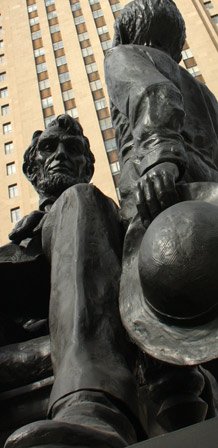For the past seven years, I’ve been honored to lead this city during a time when we’ve tackled difficult problems together and faced our challenges head on. We have learned that if we want to be the city we can be, we cannot rely on state or federal help – we must do it ourselves.
Now, I have a little more than a year left in office, which has made me reflect on how I can best use my remaining time to leave this city in better shape for our kids and grandkids. At the end of the day, I believe that’s all that really matters – each of us doing our small part in this moment in time to make sure those we love grow old in a better world than we did.
That’s why, when people ask me these days what the most impactful thing is that we’ve accomplished, I never have to hesitate to find the answer – it’s our work to increase third-grade reading proficiency across every zip code and every neighborhood. It’s also why I’m supporting a community-led effort to make sure that all Kansas City families have access to high-quality pre-K. The idea of universal pre-K is nothing new. In fact, quality pre-K has been a topic of study by education and civic representatives for over 5 years.
Back in 2011, I was educated about the critical importance of third-grade reading proficiency to a child’s education, life, and future. We analyzed third-grade reading proficiency for the first time in our City’s history and the results were so disturbing that it actually made me angry. At that point, only 33% of our third-graders were reading proficiently. Yet, no one seemed outraged about it. I couldn’t wrap my head around that. If your car only started 33% of the time, I’m betting you’d get a new car pretty quickly.
Third-grade reading proficiency might seem like a bit of an arbitrary statistic, but it’s not. The fact is, it’s a critical benchmark in a child’s development.
A child is learning to read up to third grade and then reading to learn thereafter. Children who can’t read proficiently by the third grade are 75% more likely to never catch up and fail to graduate high school at a substantially higher rate than proficient readers. This is the point at which we start to see children dramatically diverge on their paths in life.
That’s why we created Turn the Page KC in 2011 and got to work. By collaborating with others and focusing on school readiness, school attendance, and summer learning, we’ve increased third-grade reading proficiency to 55% by the end of 2017. I’m proud of that increase, but the state average is 62%, so we cannot be content to coast on our success.
In order to keep moving in the right direction, we have to do more to make sure every child shows up ready to learn on their first day of kindergarten. That’s why I’m supporting this community-led effort to invest in high-quality pre-K for all four- and five-year-olds in Kansas City.
It works like this: The city will collect a ⅜ cent sales tax on purchases made within our city limits. That will generate approximately $30 million each year that will be used to help all families afford high-quality pre-K instruction as well as to invest in pre-K programs to ensure that as many as possible are high quality.
Every Kansas City, Missouri, family with a four- or five-year-old will be eligible for a discount on pre-K tuition the year before the child begins kindergarten, but the amount of the discount will depend on their income and the quality of the pre-K program.
At a time when 50% of children enter the public schools in Kansas City behind both academically and emotionally, high-quality pre-K is a proven way to ensure that students start school ready to learn. We know that 40% of zip codes throughout the city – North, South, East, West – have a shortage of affordable, high-quality pre-K opportunities. I simply can’t walk away from City Hall a year from now knowing that so many children and families are not being served and not try to do something about it now.
To be clear, this is not a program that only benefits families with four- and five-year-olds. When we invest in pre-K, the entire city benefits through:
Reduced Juvenile Crime. Studies show that kids with high-quality, early learning experience are less likely to be involved in juvenile crime. It’s also cheaper than the millions of dollars taxpayers spend on prisons in which 49% of the prisoners failed to graduate from high school. Quality pre-K is also foundational to making sure that all kids read proficiently by the end of third grade.
An Improved K-12 System. By ensuring children start school ready to learn, high-quality pre-K has the benefit of improving the entire school system with a stronger learning environment, less need for remedial teaching, and lower dropout rates.
A Smarter Workforce. Kansas City needs more students prepared to enter the 21st century workforce. High quality pre-K programs lead to higher graduation rates, more kids going to college or developing employable skills, and a better chance at a good-paying job.
A Stronger City. By providing Kansas City four- and five-year-olds with better access to high-quality early learning, we benefit from future cost savings. Multiple studies show that for every dollar invested in early learning, a community saves at least $7 in reduced future education, criminal justice, and welfare costs.
Simply put: There is no better place in which to invest our city’s tax dollars than in our children and the high-quality pre-K programs that can prepare them to be kindergarten-ready, proficient third-grade readers, better educated and prepared for a rapidly changing workforce. Both the short- and long-term benefits of this investment are well-researched and proven.
We’ve kicked the can down the road long enough when it comes to giving Kansas City children a leg up on the future. Now is the time to invest wisely and effectively in both their future and ours.















